One of New York’s Most Vital Colleges Is Targeting Muslim Students
The Brooklyn College administration has repeatedly shown that it is willing to suppress Muslim and Palestinian speech on campus.
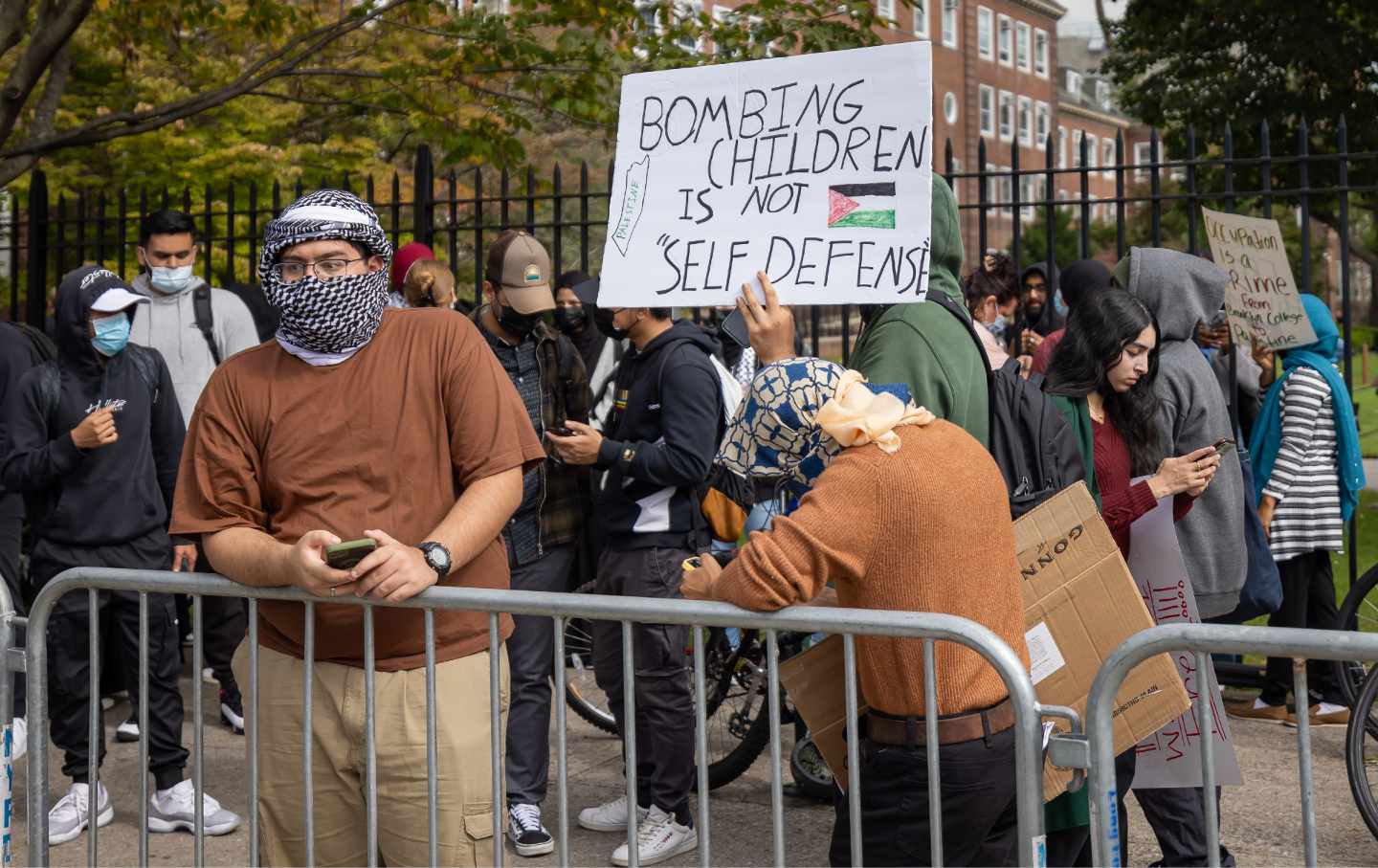
Students from Brooklyn College and supporters hold signs during a pro-Palestinian demonstration at the entrance of the campus on October 12, 2023.
(Michael Nigro / Pacific Press / LightRocket via Getty Images)On Wednesday, October 11, Brooklyn College President Michelle Anderson announced in a statement that a rally organized by Students for Justice in Palestine and other student groups scheduled for the next day had “now been moved off campus.”
Anderson wrote that students would not be penalized if they stayed away from the campus or missed class on October 12, and that the college was “taking proactive steps to increase campus security.” She then quoted City University of New York (CUNY, of which Brooklyn College is a part) Chancellor Felix V. Matos Rodriguez, who had written in a statement of his own, “We want to be clear that we don’t condone the activities of any internal organizations that are sponsoring rallies to celebrate or support Hamas’ cowardly actions. Such efforts do not in any way represent the University and its campuses.”
Prior to the announcement, CUNY administrators had received what the newspaper Hamodia called a “fierce backlash” from members of the New York City Council—including Democrats Farah Louis and Kalman Yeger and Republican Inna Vernikov—who were seemingly eager to stoke division and fear over the planned demonstration. Yeger and Vernikov had even called on the chancellor to close the entirety of CUNY for the rest of the week to protect the safety of Jewish students, but he refused. On the morning of the protest, the three politicians issued a joint statement reassuring their constituents of the “heavy police presence” that would accompany the demonstration and that Louis and Vernikov would be on hand if students felt unsafe.
SJP’s peaceful demonstration drew around 100 students, including some high school students, a sprinkling of faculty, and other visitors. Astonishingly, Vernikov showed up to join the counterprotest with a gun visible and made threatening remarks toward students, calling them “terrorists.” The police presence was intense, and multiple helicopters circled the college. Layers of police barricades had been set up and students felt “fully surrounded” by police plus the BC gates. Other students on campus not attending the protest, including a number of undocumented students, found the police spectacle frightening. Even though Vernikov’s gun was visible, police made no move against her.
Two days before the SJP rally, and three days after Hamas’s attacks on Israel, another group of students had held a pro-Israel vigil on the BC campus quad. Some students counterprotested that event. Thankfully, Anderson had sent no statement saying students could stay home if they felt unsafe because of this peaceful vigil; nor had she let the pro-Israel vigil be surrounded by police. Why the difference in treatment?
What is happening at Brooklyn College is part of a wave of anti-Muslim racism and repression that has flared in the wake of the Hamas attack. Muslim journalists have been taken off the air; a Virginia Marriott Hotel pulled out of hosting the Council of Islamic-American Relations annual banquet; three Palestinian and Egyptian men were recently attacked in Bay Ridge; and, most horrifically, 6-year-old Palestinian-American Wadea Al Fayoume was stabbed 26 times by his landlord. CAIR reported recently that it had received 774 reports of anti-Muslim incidents across the country in the two weeks since the October 7 attack. This harrowing climate brings back the worst of the past 22 years since 9/11 unleashed a barrage of public hatred and legal targeting of Muslim Americans across the United States.
Many students and faculty (myself included) were stunned by Anderson’s message. Brooklyn College has a sizable population of both Jewish and Muslim students. A college leader should treat all students as equally valuable members of the community. Instead, Anderson had marked a group of students exercising their political rights as dangerous, to be feared and heavily policed, and had equated having a pro-Palestine rally with supporting Hamas. Even though BC-SJP and BC’s Muslim Student Association reiterated, “We wish to unequivocally state that the Brooklyn College Muslim and SJP community has never endorsed the actions of Hamas, or any militant group in any of our protests, nor will we ever do so in future events or programs,” they were treated with disbelief and suspicion.
Additionally, the SJP students reported being given many layers of questioning and pushback from BC for their demonstration, leading to their moving the event off campus and allowing the college to claim that it was not responsible for the decision to do so. Even then, administrators continued to e-mail them to ask them to make Brooklyn College less prominent on their flyer.
No statement came from President Anderson or CUNY Chancellor Matos Rodriguez that evening denouncing Vernikov. In fact, no public statement has been made as of this writing. Uproar on social media over the next 24 hours about Vernikov’s gun—since it is a felony in New York to bring a gun near sensitive locations, including colleges, public schools, and “gatherings of people to collectively express their constitutional rights to assemble or protest”—led to Vernikov surrendering herself and her gun at the 70th precinct the next day. She was given a desk appearance, which requires the person to face charges in the future but is less serious than a formal arrest. Three days later, NY Mayor Adams’s top adviser, Ingrid Lewis-Martin, had “tea” with Vernikov, who reaffirmed, “We have true friends in this administration.” While a number of politicians and a petition campaign with 150,000 signatures called for Vernikov’s resignation, CUNY was silent.
Six days after President Anderson’s e-mail to the college, a multiracial coalition of 19 student groups came to Brooklyn College’s Faculty Council—a faculty governance space typically not welcoming to student voices—to call for Anderson’s resignation, saying that “the vibrant diversity which makes our school beautiful is not safe in her hands.” The groups— including the Puerto Rican Alliance, the Muslim Student Association, the Black Student Union, the BC Historical Society, the Brooklyn College Dream Team, the Korean Culture Club, and SJP —charged that “the constitutional rights of students were infringed upon and their lives placed in direct danger by President Anderson’s action.” Their unprecedented demand for her resignation (faculty at Brooklyn College could think of no time students had ever made a formal call for a Brooklyn College president’s resignation, certainly not in the past 25 years) marked the magnitude of her betrayal of their safety. It also evoked student-led protests 50 years earlier that led to the creation of the college’s Africana Studies and Puerto Rican and Latino Studies departments. Anderson called it “constructive criticism” and didn’t appear to take the call seriously.
Now, a broad, multiracial coalition of students who called for the resignation of the president of Columbia or Harvard would be big news. But because this story concerns a public college that serves the working class and whose student body is mostly people of color, there has been almost no media attention or public outcry.
Many journalists, scholars, and other advocates who focus on college students of color often train their attention on the end of affirmative action at private schools or the experiences of students of color at predominantly white institutions. This misses the far larger numbers of students of color who attend public colleges, who work, support their families, and put a lot on the line to fulfill their college dreams amid a society and a system of higher education that often treats working-class students as workers not thinkers and allocates its resources accordingly. Their ideas and experiences— and the kinds of inequalities and injustices they are subject to— are rarely investigated, let alone centered. Working-class students of color are simultaneously not imagined to be serious political actors, and routinely expected to be grateful and not complain. This media and public silence helps to provide cover for the Islamophobic reactions of CUNY and NYC officials and their ability to denigrate these students’ perspectives and safety. It also lets the state and city get away with underfunding their education. (The last time The New York Times did a serious story on the underfunding of CUNY and its impacts on the physical plant and teaching conditions was in 2016, when Michelle Obama came to give the commencement address at City College.)
Brooklyn College is one of 25 campuses that make up the CUNY system, which educates 225,000 students. The majority of CUNY students hail from working-class and poor families; over half of CUNY students come from households that earn $30,000 or less, in one of the most expensive cities in the world.
For our Brooklyn College students, many of whom are the first in their family to go to college, school has been hard-won and cherished. BC is one of the most diverse schools in America—21 percent Asian, 23 percent Black, 23 percent Latinx, and 29 percent white (including many white immigrant students, particularly from Eastern Europe). Our classes are a rainbow—African Americans and West Indians, students from Pakistan, Colombia, Yemen, and Ukraine, Uzbeki immigrants and longtime white Brooklynites, Orthodox Jewish students, Catholic Nuyoricans, and Bengali Muslims, gay, trans, and straight—talking, listening and learning across lines that often seem unbridgeable in other parts of American society. It makes teaching at Brooklyn College a profound joy and, for me, a great source of hope in these dark times we find ourselves in.
Popular
“swipe left below to view more authors”Swipe →This was not the first time students’ lives “have been placed in danger,” as the students made clear. In 2012, the Associated Press exposed the NYPD’s demographic unit and massive surveillance of Muslim life, including informants in Muslim student groups across the Eastern seaboard at schools like Yale, Rutgers, and Brooklyn College. Some college presidents criticized the NYPD; Yale’s president said that such surveillance was “antithetical to the values of Yale” and that Muslim student associations should be safe spaces “during a period when Muslims and Islam itself have too often been the target of thoughtless stereotyping, misplaced fear, and bigotry.”
Brooklyn College’s then-President Karen Gould remained silent. Then, three years later, despite the NYPD’s saying it had disbanded the Demographics Unit and abandoned this kind of blanket surveillance of Muslims, Gothamist broke an even more horrifying story. The NYPD had embedded an undercover cop among Brooklyn College’s Muslim women students from 2011 to 2015, who prayed with them, went to their field trips and weddings, and attended community events and meetings of a new coalition of BC’s students of color groups. Because of the attention the Gothamist story elicited, the NYPD was forced to admit it had placed an undercover cop at BC, though no indictments resulted from the BC surveillance.
Michelle Anderson became Brooklyn College’s 10th president in 2016, and students and faculty (including myself) met with her and urged her repeatedly to publicly repudiate the NYPD for these tactics. In February 2017, over 100 faculty sent her a letter stressing how “this public silence…sends a troubling message that we tolerate this targeting of our students.” Yet she did not publicly condemn the NYPD’s tactics; nor did the chancellor. Again, The New York Times and other news organizations stayed quiet.
While many faculty spoke out against it, a number of other BC educators have supported the college’s response to BC-SJP’s peaceful rally. Along with some politicians and other New Yorkers, some faculty have echoed the idea that Jewish students are right to feel unsafe, in effect encouraging students to see each other as dangerous. Being rightfully devastated and outraged at Hamas’s atrocities against Israelis should not extend to seeing Palestine-supporting students as potential terrorists or coddling racist fears of “dangerous” Muslims—and yet, too many have bowed to these fears.
As horrifying as this rising Islamophobia is, the coalition of student groups that has emerged at Brooklyn College to challenge this treatment embodies a much different spirit. Not on their watch, this cross section of students made clear, would certain members of the college community be dehumanized and put in harm’s way. They knew they were putting a lot on the line—but they well understood the stakes and the importance of such collectivity. At the meeting, as Anderson continued to evade the anti-Muslim racism of her response, one student rose to deconstruct the dangers of her statement: “I refuse to go back to the days in this country, and in this city in which Muslims and individuals who support Muslims are scapegoated and attacked due to dehumanizing, false and bigoted narratives.”
Note: This piece originally said that no statement had been made by Michelle Anderson regarding Inna Vernikov’s decision to bring a gun to the October 12 protest. According to a follow-up piece in The Nation by Brooklyn College Prof. David Brodsky, Anderson made a critical reference to the incident in an internal faculty meeting. This piece has been updated to clarify that Anderson has not made any public statement about the incident.
Thank you for reading The Nation!
We hope you enjoyed the story you just read, just one of the many incisive, deeply-reported articles we publish daily. Now more than ever, we need fearless journalism that shifts the needle on important issues, uncovers malfeasance and corruption, and uplifts voices and perspectives that often go unheard in mainstream media.
Throughout this critical election year and a time of media austerity and renewed campus activism and rising labor organizing, independent journalism that gets to the heart of the matter is more critical than ever before. Donate right now and help us hold the powerful accountable, shine a light on issues that would otherwise be swept under the rug, and build a more just and equitable future.
For nearly 160 years, The Nation has stood for truth, justice, and moral clarity. As a reader-supported publication, we are not beholden to the whims of advertisers or a corporate owner. But it does take financial resources to report on stories that may take weeks or months to properly investigate, thoroughly edit and fact-check articles, and get our stories into the hands of readers.
Donate today and stand with us for a better future. Thank you for being a supporter of independent journalism.
Thank you for your generosity.
More from The Nation
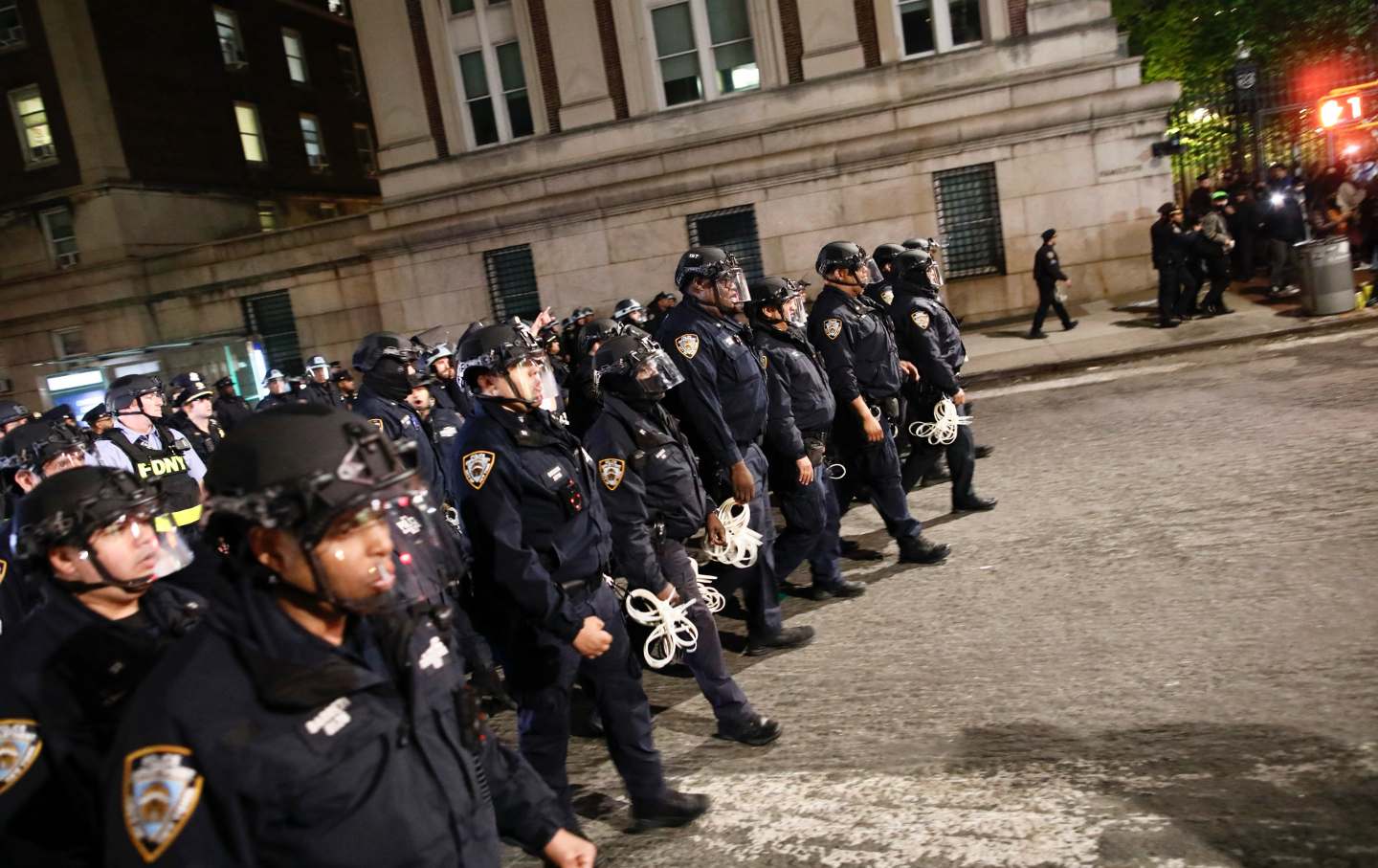
Columbia’s Violence Against Protesters Has a Long History Columbia’s Violence Against Protesters Has a Long History
An overlooked history of selective policing at Columbia has undermined the safety of those within as well as beyond campus walls.
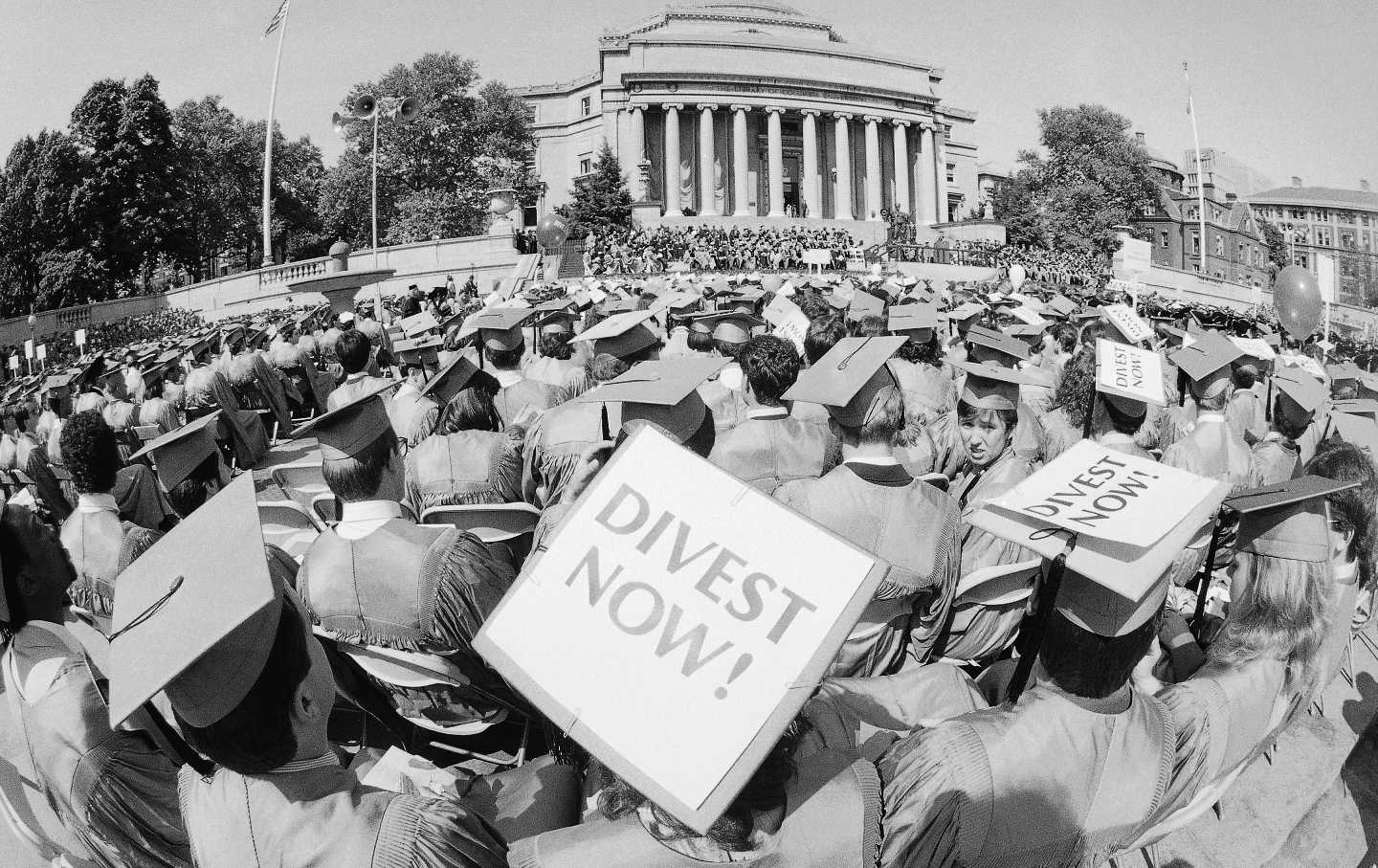
When We Occupied Columbia in 1978, the University Didn’t Call the NYPD When We Occupied Columbia in 1978, the University Didn’t Call the NYPD
Campus administrators met student demands to divest from apartheid-era South Africa. What’s changed?
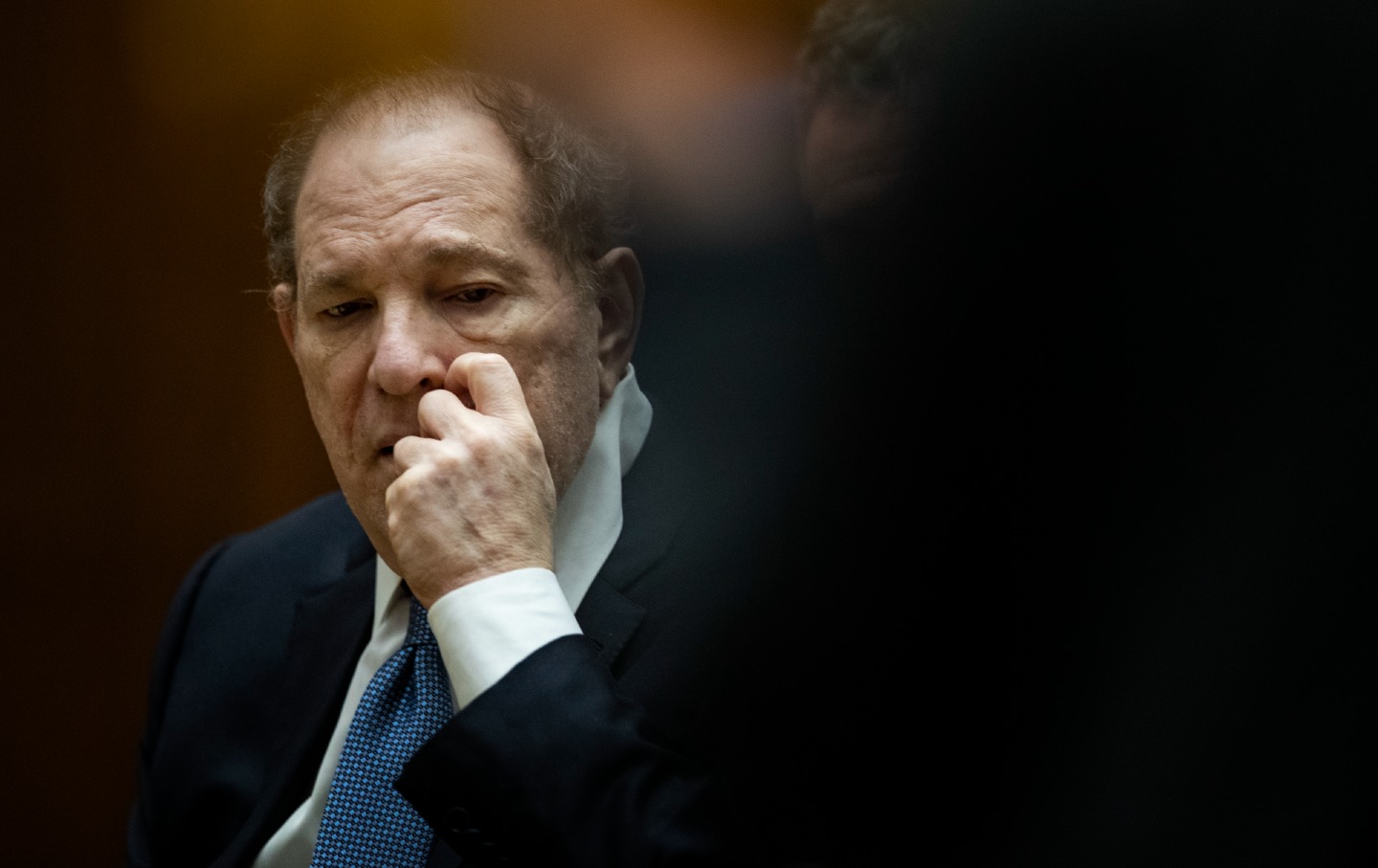
Harvey Weinstein’s Reversal of Fortune Harvey Weinstein’s Reversal of Fortune
Though the movie mogul’s acquittal stunned the New York media, anyone who attended the trial without blinders could have seen it coming.
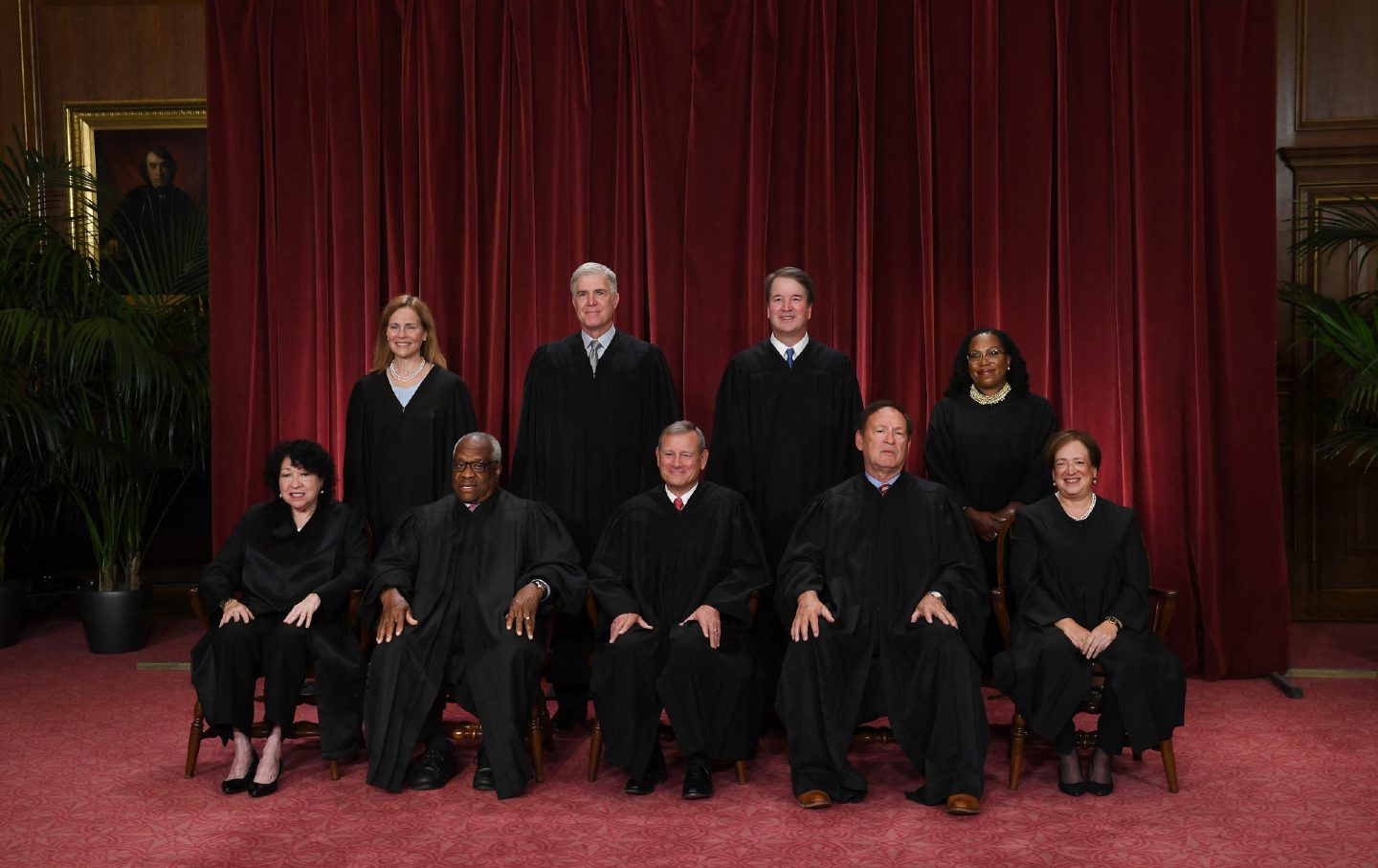
The Media’s Coverage of Trump’s Immunity Case Has Been Appalling The Media’s Coverage of Trump’s Immunity Case Has Been Appalling
By covering the Supreme Court’s hearing of Trump’s immunity claim as if the court were impartial and nonpartisan, the media has done the American people a serious disservice.
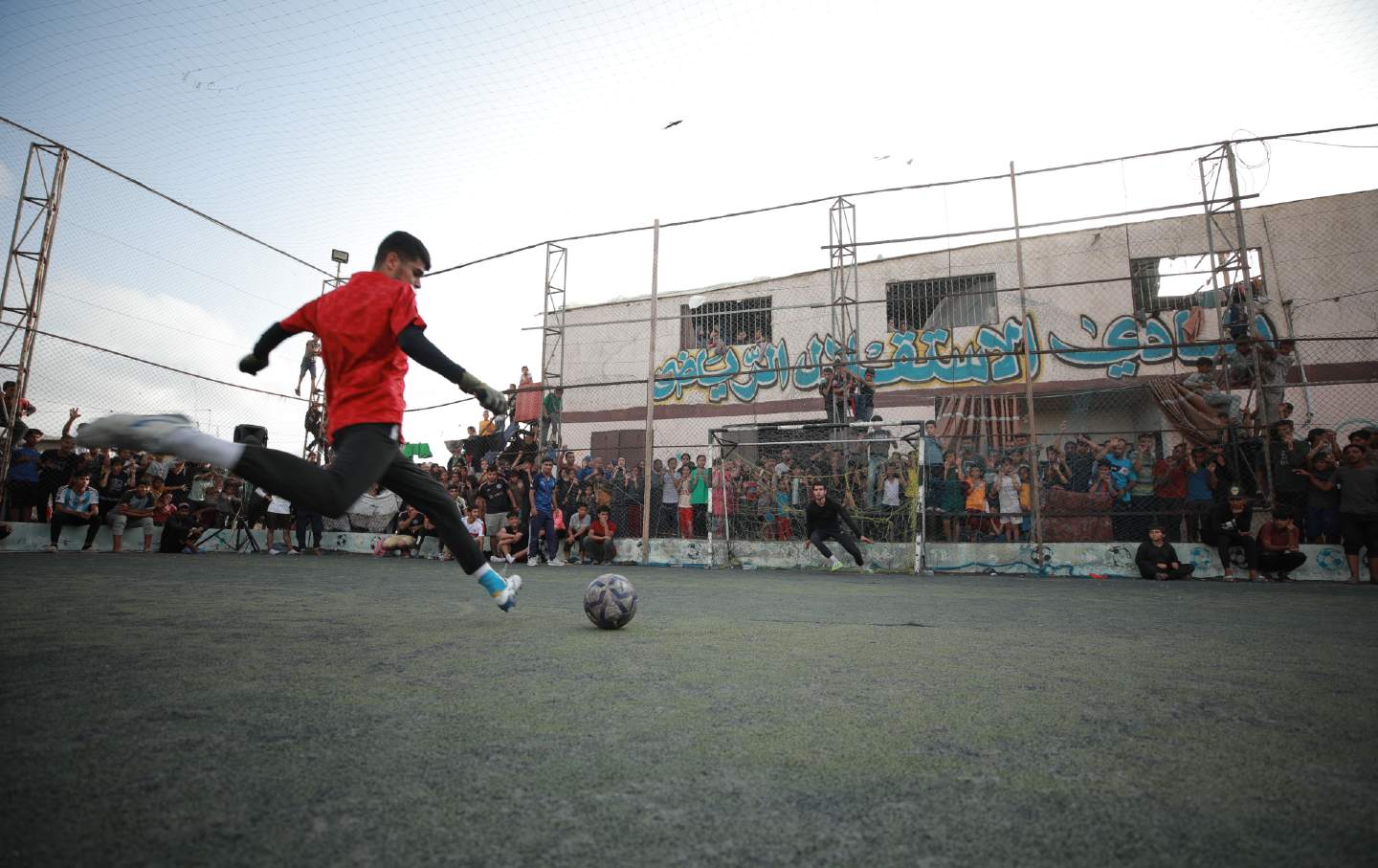
Palestinians Stand Up to Israel Through Soccer Palestinians Stand Up to Israel Through Soccer
The American Friends Service Committee staged a youth soccer tournament in Rafah, showcasing the joy that the sport can offer.
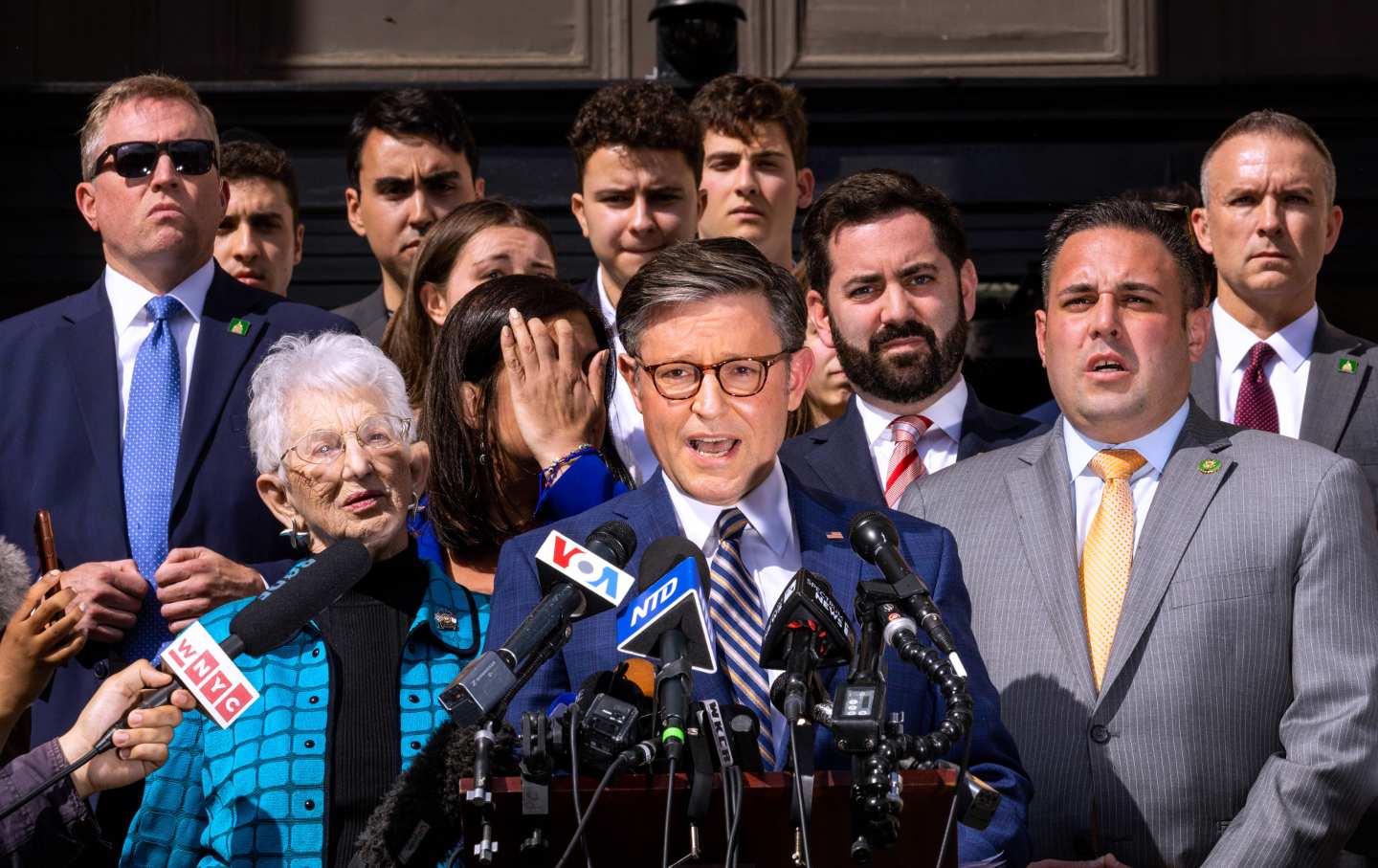
The Attacks on the Palestine Movement Are Getting Stupider by the Second The Attacks on the Palestine Movement Are Getting Stupider by the Second
The enemies of the movement have always been bigots and liars. But we’re reaching an even more hysterical state. What’s going on?


